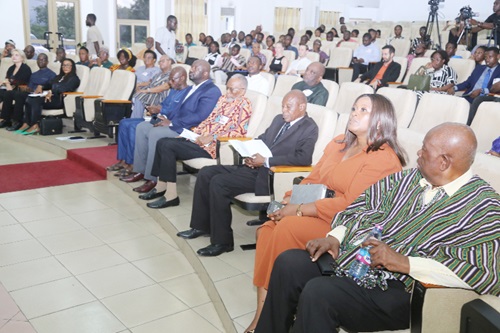
Four individuals have expressed worry over the abuse of the constitutionally guaranteed freedom of expression, arguing that the intended freedom has been converted into a right to abuse rather than constructive contribution to society.
They blamed media plurality for the situation, saying it had "unfortunately been corrupted" by the takeover of the media space by politicians. The panellists were a retired Justice of the Supreme Court, Justice William Atuguba; a former Chairperson of the Electoral Commission (EC), Charlotte Osei; the Member of Parliament for Anyaa Sowutuom, Dr Dickson Adomako Kissi, and the President of the Ashesi University, Patrick Awuah.
They argued that the media space, in some cases, had become "journalists attacking fellow journalists; media houses against media houses, depending on which politician controls the media house".
The eminent panellists were contributing to the topic: "Free speech and academic freedom: Where do we draw the line? The forum was organised by the Harvard Club of Ghana headed, by Dr Sangu Delle, Chief Executive Officer of CarePoint, and the University of Ghana School of Law in Accra last Friday.
The panellists were of the view that the dominance of the media ownership by political figures had contributed largely to attacks on journalists. Mrs Osei called for public engagement for citizens to start tuning off such "poisonous" stations.
"Political leaders are losing their credibility. Their actions have become a collective injury to ourselves. It has become a slippery slope," she said. "We have lost our sense of direction by using state power against citizens and journalists. This is no different from what happened under military rule," she added.
The former EC Chairperson said insults and the use of intemperate language by political actors had become "a useful tool" for such people to be recognised and promoted.
Justice Atuguba said although freedom of expression had been enshrined in the 1992 Constitution, many people were unable to enjoy it "because politics has developed into a Bermuda triangle".
He said until such practice was stopped, freedom of expression would remain in "our books, but would hardly be enjoyed”.
The former Justice of the Supreme Court said such a culture silenced those with neutral views, thereby weakening the gains made in "our democracy". Speaking to the Human Sexual Rights and the Ghanaian Family Value Bill and whether the rights of minority groups were being infringed, Justice Atuguba said such people, especially those with known history, should be studied and offered medical support instead of custodial sentences.
Dr Adomako Kissi, however, deviated from the trend by blaming the phenomenon on the country’s culture. He said people were unable to confront the truth because of the country's cultural practices, citing examples between Ghana and the United States of America.
"In trying to be liberated, we must be cautious. But Ghanaians have the liberty to choose which station to listen to. If we do so, gradually the nuisance ones will fold up," he said.
Mr Awuah, in proffering solutions to the situation, called for a study of the democratic cultures of other countries to help shape and redirect the intemperate culture.
To him, people should be empowered to pursue their aspirations so that they become better citizens.
Offering a dichotomy between freedom of speech and academic freedom, Prof. Kwadwo Appiagyei-Atua of the University of Ghana Law Faculty said the constituent elements in academic freedom were to seek, receive and impact ideas regardless of the frontiers.
He said academic freedom was influenced by the purpose of the university, including truth seeking, receiving or thinking, and knowledge production. The Law professor said academic freedom was a shield and a sword to promote certain freedoms according to the purposes of the university, and limited what the State could do.
"Freedom of expression is universal but academic freedom is limited to the confines of the universities. 
"Freedom of speech and academic freedom differ but without freedom of speech, there can't be academic freedom," he said.